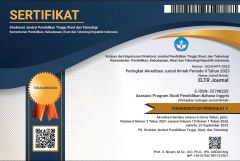VISUAL LITERACY: COMIC STRIPS AS TEACHING MEDIA IN SIMPLE PRESENT TENSE
Abstrak terlihat: 639 / PDF terunduh: 442DOI:
https://doi.org/10.37147/eltr.v8i1.182Keywords:
comic strips, learning grammar, simple present tense, teaching mediaAbstract
This study aims to measure the effectiveness of using comic strips as learning media for seventh-grade students in Simple Present Tense at SMPN 2 Sewon. The problem in this study was the students' understanding of grammar, especially in simple present tense, was low. This research is Quantitative, with a quasi-experimental pre-test and post-test as the research design. The comic strips used in this study were made by the researcher herself. The sample of this study was seventh-grade students, The total amount was 64 students, who were divided into two classes, namely experiment and control. The experiment class was given treatment in the form of comic strips as teaching media after the pre-test, while the control class was not. The results showed sig. (2-tailed) 0.000 < 0.05 and (-8.633) < (-2.039). Based on the result, it can be concluded that there is a significant difference between the learning outcomes in the pre-test and post-test in the experimental class. Comic Strips proved to be effective to be used as teaching media to help students' learning process in English grammar, especially simple present tense.
Downloads
References
Aki, A. N., & Rorintulus, O. A. (2023). A systematic review: The use of pictures in teaching simple present tense sentence construction to junior high school students. Journal of English Language Teaching, Literature and Culture, 2(1), 40–50. https://doi.org/10.53682/jeltec.v2i1.6231
Arbuckle, K. (2004). The language of pictures: Visual literacy and print materials for adult basic education and training (ABET). Language Matters, 35(2), 445–458. https://doi.org/10.1080/10228190408566228
Brown, H. D., & Lee, H. (2015). Teaching by principles: An interactive approach to language pedagogy. New York: Pearson Education.
Cabrera, P., Castillo, L., González, P., Quiñónez, A., & Ochoa, C. (2018). The impact of using Pixton for teaching grammar and vocabulary in the EFL Ecuadorian context. Teaching English with Technology, 18(1), 53–76.
Celce-Murcia, M., & Heinle, H. (2001). Teaching English as a second or foreign language. In M. Celce-Murcia (Ed.), Teaching English as a second or foreign language (pp. 219–232). Boston, MA: Heinle & Heinle.
Cimermanová, I. (2015). Using comics with novice EFL readers to develop reading literacy. Procedia - Social and Behavioral Sciences, 174, 2452–2459. https://doi.org/10.1016/j.sbspro.2015.01.916
Creswell, J. (2012). Educational research: Planning, conducting, and evaluating quantitative and qualitative research (4th ed.). New York, NY: Pearson Education.
Effendi, M. S., Rokhyati, U., & Rachman, U. A. (2017). A study on grammar teaching at an English education department in an EFL context. International Journal on Studies in English Language and Literature, 5(1), 42–46. https://doi.org/10.20431/2347-3134.0501005
Harmer, J. (2010). The practice of English language teaching (4th ed.). Essex: Pearson Longman.
Koleini, N., & Hashemian, M. (2021). Comic strips and grammar development among Iranian teenage EFL learners. International Journal of Research in English Education, 6(4), 18–35. https://doi.org/10.52547/ijree.6.4.18
Mcvicker, C. J. (2018). Visual literacy and learning to read: Using comic strips for reading instruction. Journal of Visual Languages & Computing.
Mitra, M., & Keziah, S. (2019). Advantages of using comics pedagogy in English language teaching - A practical approach. Pramana Research Journal, 9(6), 1441–1451.
Newfield, D. (2011). From visual literacy to critical visual literacy: An analysis of educational materials. English Teaching, 10(1), 81–94.
Octaviani, W., Angraini, N., & Ulfah, B. (2022). The use of Instagram as a media for learning simple present tense of the eighth-grade students of SMP N 3 Palembang in the 4.0 era. ULIL ALBAB: Jurnal Ilmiah Multidisiplin, 2(1), 300–310. https://doi.org/10.56799/jim.v2i1.1213
Özdemir, E., & Ery?lmaz, A. (2019). Comics in science teaching: A case of speech balloon completing activity for heat related concepts. Journal of Inquiry Based Activities (JIBA), 9(1), 37–51.
Permatasari, D., & Aryani, F. (2023). Duolingo: An enchanting application to learn English for college students. ELTR Journal, 7(2), 101–109. https://doi.org/10.37147/eltr.v7i2.176
Rakhmawati, D. (2018). The effectiveness of English comic in teaching grammar (present and past tense). Jurnal Smart, 4(1), 52–60. https://doi.org/10.26638/js.599.203x
Saefudin, D. P., Mulyadi, M., & Santosa, P. P. P. (2023). The analysis of flouting maxim in the @pepekomik comic strip. SALEE: Study of Applied Linguistics and English Education, 4(2), 367–379. https://doi.org/10.35961/salee.v4i2.764
Saputra, M. A. (2020). A comparison on motivation in learning English between who taught by using picture stories and who taught by using conventional technique of the second year students’ of Madrasah Tsanawiyah Darul Hikmah Pekanbaru. SALEE: Study of Applied Linguistics and English Education, 1(01), 39–50. https://doi.org/10.35961/salee.v1i01.76
Sari, M. K., & Putri, Y. (2018). The implementation of using picture media on teaching present continuous tense. LANGUAGE CIRCLE: Journal of Language and Literature, 13(1), 1-7.
Sekelj, A., & Rigo, I. (2011). Teaching English grammar in primary school. Tabula: ?asopis Filozofskog fakulteta, Sveu?ilište Jurja Dobrile u Puli, 9, 188–199. https://doi.org/10.32728/tab.09.2011.14
Solihat, A., & Syahrizal, T. (2020). The implementation of Jigsaw method in teaching simple present tense. PROJECT (Professional Journal of English Education), 3(2), 252-258. https://doi.org/10.22460/project.v3i2.p252-258
Sugiyono, P. D. (2013). Metode penelitian kuantitatif, kualitatif, dan tindakan. Bandung: Alfabeta.
Utomo, D. T. P., & Ahsanah, F. (2020). Utilizing digital comics in college students’ grammar class. Journal of English Language Teaching and Linguistics, 5(3), 393-403. https://doi.org/10.21462/jeltl.v5i3.449
Wijaya, E. A., Suwastini, N. K. A., Adnyani, N. L. P. S., & Adnyani, K. E. K. (2021). Comic strips for language teaching: The benefits and challenges according to recent research. ETERNAL (English, Teaching, Learning, and Research Journal), 7(1), 230-248. https://doi.org/10.24252/eternal.v71.2021.a16
Downloads
Published
How to Cite
Issue
Section
License
Copyright (c) 2024 Eri Setianingsih, Sri Wiyanah

This work is licensed under a Creative Commons Attribution-ShareAlike 4.0 International License.











 ELTR Journal,
ELTR Journal, 